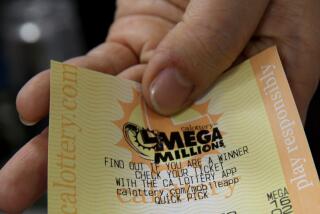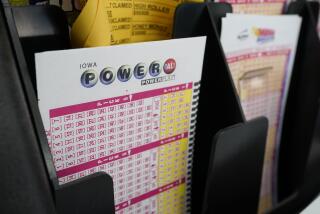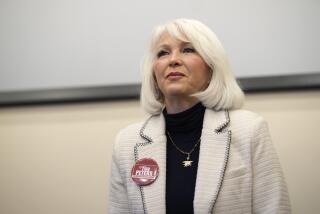Nurse Hits $3.4-Million Jackpot, This One in Court
- Share via
An ecstatic Doris Barnett shrieked and sobbed with joy Tuesday as Los Angeles Superior Court jurors awarded her a $3-million prize she lost more than three years ago in the California Lottery’s weekly Big Spin contest.
The 54-year-old hospital nurse, sitting in a front-row seat in the downtown County Courthouse, embraced her two daughters and son-in-law and cried after the court clerk announced that jurors had decided the grand prize belonged to Barnett, along with $400,000 in damages.
Barnett launched into a similar celebration in 1985 when her prize ball landed in a $3-million slot on the Big Spin wheel. But seconds after the televised ceremony’s host declared her the grand prize winner, the ball popped out and into a $10,000 slot.
The five-woman, seven-man jury deliberated just over a day in deciding by a 9-3 vote--the absolute minimum needed for a verdict in a civil case--that the $3-million prize belonged to Barnett. The jurors voted 10 to 2 to award damages for the emotional trauma she suffered when the prize was taken away.
Before dismissing the jury, Superior Court Judge Robert B. Lopez noted with a smile that he had reminded members of the panel, “Keep your eye on the ball.”
Barnett then plunged in among the jurors, hugging them and exclaiming: “Oh, thank you. Thank you.”
Despite her unalloyed joy, Barnett’s fight for the prize might not be over. The state could appeal, holding up the award.
John Schade, a spokesman for the California State Lottery, said by telephone from Sacramento that state officials were trying to decide whether to challenge the jury’s verdict. But any worries about the future seemed distant as Barnett faced reporters in a corridor press conference. The happy winner clapped her hands, stamped her feet and confided that being a millionaire “feels so good.”
“It feels wonderful. I was praying every moment. I never stopped praying,” she said.
Barnett said she plans to use the prize money to become a registered nurse; take care of her 82-year-old mother, who is blind and diabetic, and send her children--a son and three daughters--to college. Two of her daughters, Vickie Barnett and Jane Jackson, leaped to their feet when the verdict was read.
“They gave it to me, and they tried to take it back,” Barnett told reporters. “You don’t know--3 1/2 years. . . . Oh, God, I can sleep. Oh, God, I’m so happy.”
Barnett won and then lost her prize in a few seconds on Dec. 30, 1985. After first announcing that she had won the $3 million, Big Spin master of ceremonies Geoff Edwards nervously tapped Barnett on the back and told her the ball had not stayed in that slot long enough.
When state officials sent her a $10,000 check, she refused to cash it and filed suit.
Barnett said she never doubted that she was entitled to the grand prize.
“I didn’t win that (the $10,000). I won $3 million,” she said.
She complained that she suffered duress after her loss, when she was pointed out at supermarkets and hair salons in her Southwest Los Angeles neighborhood as “that lady who lost the $3 million.”
“Was I depressed? I’ll tell you!” Barnett said before the trial. “I couldn’t talk to nobody. I didn’t want to hear the television on. People would ask, ‘How does it feel to be a millionaire for three seconds?’ That hurt.”
State Deputy Atty. Gen. Norman B. Peek, who represented the Lottery Commission at the weeklong trial, maintained that Barnett was only entitled to $10,000.
In a pretrial memo, state attorneys detailed their side: “Just as the wheel came to a stop, the ball dropped into the $10,000 segment.”
At that moment, Harold Diaz, the lottery drawing official on hand during Barnett’s spin, “commenced timing the amount of time the ball was in the $10,000 slot, and that exceeded the requisite five seconds under the rules. . . . Therefore, Mrs. Barnett was awarded the prize of $10,000.”
Peek argued that Edwards had made a mistake by announcing Barnett as a $3-million winner too quickly.
“She agreed when she bought her ticket to abide by the rules--all of them,” he said. “I think Ms. Barnett is asking for you to make an exception for her.”
During the trial, Barnett’s lawyers, Lawrence Sperber and David B. Shapiro, argued that lottery officials had rarely abided by their own rules in waiting for the timer’s verification before announcing a winner.
Barnett’s lawyers came to court with a stack of videotapes to show to the jury, the most important of which allowed jurors to view Barnett’s disputed spin from several different camera angles, suggesting several different time spans, ranging from 2 1/2 seconds up to five seconds.
The lawyers also used videotapes of other contestants on the Big Spin to argue that state officials did not always use a five-second waiting period before awarding prizes. In some cases, Sperber and Shapiro argued, prizes were awarded even before the large wheel stopped spinning.
“If they’re not going to wait five seconds, then they can’t come into this courtroom today and say to you that she had to wait five seconds,” Sperber told jurors in closing arguments last week. “Why should she be treated any differently?”
“The ball wasn’t in the slot for five seconds,” juror Roy Love told reporters after the verdict, “but we didn’t see the rule being applied” to other contestants.
After conversations with several jurors, Sperber said that they “felt that Barnett had been discriminated against.”
“They viewed all the other spins, and it was obvious to them that (the state) didn’t deal with her the way they dealt with the others,” he said.
Sperber said several jurors told him that state officials should have awarded Barnett a second chance at the wheel. On the tape, Sperber said, a horn sounded, which normally goes off only when a contestant is supposed to be given another spin.
“The horn was an indication to jurors that she deserved another spin,” he said.
More to Read
Sign up for Essential California
The most important California stories and recommendations in your inbox every morning.
You may occasionally receive promotional content from the Los Angeles Times.













